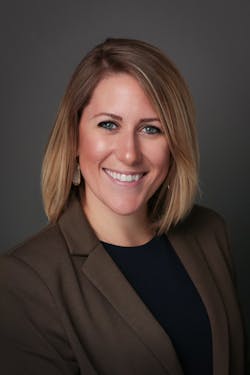2018 Airport Business Top 40 Under 40: Maggie J. Bishop
Maggie J. Bishop
Business Development Analyst, Air Service Development
Indianapolis Airport Authority
Age: 28
- Alma Mater: Southwestern University
- Favorite Aircraft: Boeing 787
- Favorite Book: The Alchemist, Paulo Coelho
- Favorite TV Show: Peaky Blinders
- Favorite Movie: Ocean’s Eleven
- Favorite Hobbies: teaching yoga, playing soccer, going to concerts
Maggie Bishop, business development analyst for Indianapolis Airport Authority, is making a name for herself in the air service development community while still in her 20s. Thanks to her efforts, Indianapolis International Airport landed its first year-round trans-Atlantic flight to Paris Charles de Gaulle Airport in May.
Bishop got involved in air service development in 2012 when she was director of business retention and expansion for the Greater Austin Chamber of Commerce in Texas. In that job, she coordinated the chamber’s Air Service Task Force that led to the city’s first trans-Atlantic non-stop route, to London Heathrow Airport, in March 2014.
“The more I dug in during my time at the chamber, the more I realized that air service development was just economic development — with airplanes,” said Bishop. “What was so great was people calling to say they wanted to open offices in Austin because of this flight. After that, I knew I had to get into [the airport] business. I loved my job in Austin, but I caught the aviation bug.”
Bishop’s favorite part of her job is giving people their time back via nonstop flights out of Indianapolis. “I had a friend who was taking a flight who thanked me. He said ‘I get to leave a day later for a work trip because of this nonstop flight,’” further maximizing time with his family she said. “I also love being an ambassador of Indianapolis from the aviation community and telling our story on how the city has grown.”
What’s so appealing about the aviation industry? “On the surface level, airplanes are sexy. And everyone has a fascination with or affinity for flying,” said Bishop. “But if you dig into it, it’s a complex industry that’s influenced by myriad economic and human factors.”
The future of aviation for Bishop is about growing the pilot population. “I’d like to see more excitement about being airline pilots. We’ve been dealing with this issue for awhile and it’s been tough to resolve,” she observed. “Here in Indianapolis we support several aviation career development programs to help enhance the aviation talent pipeline.”
